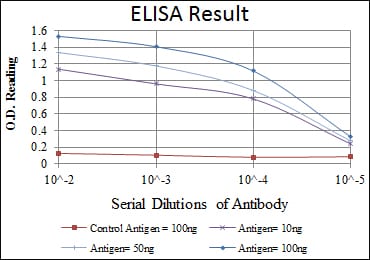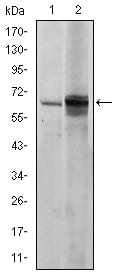

| WB | 1/500 - 1/2000 | Human,Mouse,Rat |
| IF | 咨询技术 | Human,Mouse,Rat |
| IHC | 咨询技术 | Human,Mouse,Rat |
| ICC | 技术咨询 | Human,Mouse,Rat |
| FCM | 咨询技术 | Human,Mouse,Rat |
| Elisa | 1/10000 | Human,Mouse,Rat |
| Aliases | SLK; SYN; MGC45350 |
| Entrez GeneID | 2534 |
| clone | 2H8 |
| WB Predicted band size | 61kDa |
| Host/Isotype | Mouse IgG1 |
| Antibody Type | Primary antibody |
| Storage | Store at 4°C short term. Aliquot and store at -20°C long term. Avoid freeze/thaw cycles. |
| Species Reactivity | Human,Mouse |
| Immunogen | Purified recombinant fragment of human FYN expressed in E. Coli. |
| Formulation | Ascitic fluid containing 0.03% sodium azide. |
+ +
以下是关于FYN抗体的3篇参考文献及其摘要概括:
---
1. **文献名称**:*Fyn promotes T cell receptor-induced actin remodeling by regulating ezrin-radixin-moesin proteins*
**作者**:Davidson, D., et al.
**摘要**:该研究利用FYN特异性抗体,揭示了FYN激酶在T细胞受体(TCR)信号通路中的作用,证明其通过调控ezrin-radixin-moesin(ERM)蛋白的磷酸化,促进T细胞活化过程中的细胞骨架重塑和免疫突触形成。
2. **文献名称**:*Fyn kinase induces synaptic and cognitive impairments in a transgenic mouse model of Alzheimer's disease*
**作者**:Lee, G., et al.
**摘要**:通过使用FYN抗体进行免疫组化和Western blot分析,该研究发现FYN激酶在阿尔茨海默病模型中异常激活,导致Tau蛋白过度磷酸化及突触功能障碍,提示FYN是神经退行性疾病治疗的潜在靶点。
3. **文献名称**:*Fyn-dependent regulation of glioblastoma cell motility and invasion*
**作者**:Saito, Y.D., et al.
**摘要**:此研究采用FYN抗体阻断实验,证明FYN激酶通过调控整合素信号通路和细胞外基质重塑,促进胶质母细胞瘤细胞的迁移和侵袭能力,为靶向FYN的癌症治疗策略提供了依据。
4. **文献名称**:*Development and validation of a monoclonal FYN antibody for flow cytometry applications*
**作者**:Brady-Kalnay, S.M., et al.
**摘要**:该文献报道了一种新型FYN单克隆抗体的开发与验证,通过流式细胞术和免疫沉淀实验证明其高特异性,适用于检测FYN蛋白在淋巴细胞和肿瘤细胞中的表达水平及激活状态。
---
这些研究涵盖了FYN抗体在信号转导、神经疾病、癌症及抗体开发中的关键应用。如需具体文献来源,建议通过PubMed或Web of Science搜索标题及作者获取全文。
FYN antibody is a research tool targeting FYN, a non-receptor tyrosine kinase belonging to the Src family. FYN plays critical roles in signal transduction pathways, particularly in T-cell receptor signaling, neuronal development, and cellular communication. It contains SH2 and SH3 domains that mediate protein-protein interactions and regulate downstream signaling cascades involved in cell proliferation, differentiation, and migration. Dysregulation of FYN has been linked to cancers, neurological disorders (e.g., Alzheimer's disease), and immune system abnormalities.
FYN antibodies are widely used in biomedical research to detect and quantify FYN expression through techniques like Western blotting, immunohistochemistry, and flow cytometry. They help investigate FYN's dual roles in cellular processes: while its activity supports normal neuronal plasticity and immune responses, aberrant FYN signaling may promote tumor metastasis or neurodegeneration. Some studies focus on FYN isoforms (e.g., neuronal-specific splice variants) and their distinct functions.
Commercial FYN antibodies are typically produced in hosts like rabbits or mice using immunogenic peptides from conserved regions. Validation includes testing on FYN-knockout cell lines to confirm specificity. As therapeutic targeting of tyrosine kinases advances, FYN antibodies remain essential for elucidating disease mechanisms and validating potential drug targets in preclinical models.
×